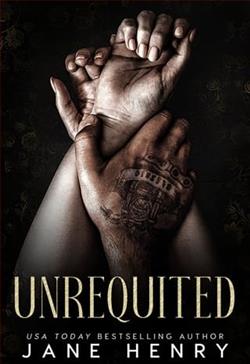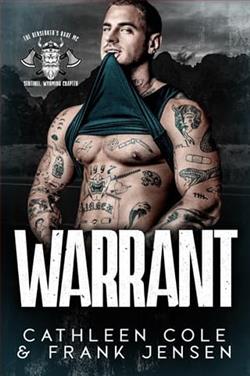Page 11 of Heartbreak Bay
She’s thrown it right back, and I feel Lanny’s gaze heavy on me. Lanny doesn’t own a gun, but she’s been taking classes once a week; she and I practice together. She’s getting to be a decent shot too.
“Here’s the deal,” I tell Vee. “You do classes with us at the range, starting tonight. You only get to buy a gun when I say you’re ready to have one, and that means when you’re officially eighteen. And when you do get one, you keep the practice up. I’ll check. Understand?”
She nods and doesn’t answer, too busy chewing. I’m not sure I’ve made a good decision. Vee Crockett isn’t a stable personality; she’s got volatile peaks and spikes, and she’s been prone to self-harm before, through pills and booze and just plain recklessness. But she’s also vulnerable, and that letter is proof that something’s up. The fact that he knows where she lives ... it’s worrying.
Best call I can make, for now.
Vee finishes her breakfast, and I offer to drive her to her apartment so she doesn’t have to walk back in those ridiculous house shoes. She accepts.
Once the kids are headed into their classes, it’s just her and me alone in the car. I say, “You already have a gun, don’t you?”
She flinches and turns her head too fast. “Why’d you say that?”
“Because I know you, Vee. You don’t ask permission. Youmightask forgiveness, sometimes.”
She shrugs and turns away, but I see the color’s warmed in her cheeks. “My business,” she says. “Ain’t it?”
It is. Vee Crockett is an emancipated adult, and though she can’t legally own a gun yet, I’m not inclined to turn her in for it either. There’s no time in a woman’s life that isn’t dangerous, and that’s just a fact of life. “You made it my business this morning. I’m going to the range tonight here in town. I’ll pick you up and we’ll look over your gun and see what you can do with it. All right?”
She hesitates, then nods once. Her jaw is stiff. She doesn’t like this; I’m coming close to her limits of obedience. She’ll like it even less once we’re at the range, but I intend to train her properly.
When I pull to a stop at her apartment complex—a cheap place, but clean—she gets out and marches away in her ridiculous floppy slippers without another word. A man outside smoking on the walkway gives her a long, appraising stare. She flips him off, unlocks her door, and slams the door after.
I don’t like the look on the man’s face, and I sit idling in the parking lot until he discards his butt and heads into one of the apartments. I make a note of his room number.
I’m a suspicious bitch, but I’ve found it works for me.
5
KEZIA
Dawn’s just breaking when I make it to Sheryl Lansdowne’s hometown. Valerie’s not much, just bumpy streets and clapboard houses; whatever overflow Norton and Stillhouse Lake have from the K-ville commuters, they don’t make it this far out. The place has a depressed look, but that could be just the gloom. The few streetlights struggle against it and lose.
I know, because I know these towns, that everybody awake is rubbernecking at my car cruising down the street. They’d know everybody in town, and every set of wheels on the road. I see a few lights coming on in houses as I glide past, and then I take two more turns and pull to a stop in front of the address for Sheryl Lansdowne. I don’t see another vehicle in the driveway. Lights are on inside, though, frosting the white curtains. It’s a nicer house than I expected. Bigger than the others.
I park and take a second to get ready. This is the unknown, whatever happens: either I find a person waiting who’s about to get a horrible shock, or I find something else that makes this whole puzzle clearer, or I find nothing at all. I’m tired, but I get my head clear. I have to.
The air outside is chilly but doesn’t have that oppressive stench the pond did, and I’m grateful. I take it down in gulps as I head up the path. The lawn’s a little overgrown, needs a good shape-up, but that’snot significant. I go to the front door and look for a bell. There isn’t one, so I knock—forceful, unhesitating knocks. No point being indecisive.
I hear a dog race toward the front, barking. Sounds like a small one, at least. I make a note in my book and put on evidence gloves before I even consider touching the doorknob. Evidentiary value of the outside doorknob isn’t much, though, so I go ahead and turn it.
Locked.
No other lights come on inside the house.
Just to be on the safe side, I knock again, louder and longer. There’s no response, though I can see lights flashing on in neighboring houses. I’m waking up the whole damn town. Great.
I head around the side, making my way carefully with the help of my flashlight, and sure enough, there’s a back door. It’s locked too. I see what I can through the curtains; nothing out of place except the clearly unhappy dog, who charges into the kitchen area and sends dry food flying when he kicks the bowl. He’s a little terrier of some kind, I think. Loyal, at least.
Whatever’s happened to her, Sheryl Lansdowne didn’t leave herself vulnerable here; plenty of rural folks leave windows open, doors unlocked, but she has this place secured. So why did she take her kids out there on the roads so late at night? I don’t know. I didn’t see suitcases, or even so much as a diaper bag, in that car. She couldn’t have been on the way somewhere, or she wouldn’t have left all these lights burning and the dog alone. It’s a fair-size house, and I doubt she had money to waste on an unnecessary electric bill. Nobody out here does.
I retreat from the back door and take another look around. All the windows are locked down. Nothing to do here. I don’t see anything suspicious at all.
I go back to my car and I’m starting it up when I see the next-door neighbor’s front door open, and a big, older man in a checked robe steps out to stare at me. I roll down the window and gesture, and he comes over with a deliberate, heavy gait. He stops a couple of feet away,still staring. He’s white, with a well-worn face and a red drinker’s nose, though that could charitably be because of a cold or the chill. “What you want ’round here?” he asks me bluntly. I pull out my shield and show it to him. It saves time. His mood alters a little fromsuspicious black womantosuspicious black woman with a badge. I know he’s got a handgun in the pocket of that robe; it’s pretty damn obvious.
He grunts and cinches the frayed belt a little tighter. “Well, you ain’t local,” he observes. No, I’m not. Few black people in this little town; it’s the legacy of the sundown laws officially in place until the sixties, where people like me had a curfew to be out of town every night. Still unofficially enforced.
“I’m Detective Kezia Claremont from Norton PD,” I tell him. “You know your neighbor there?”















